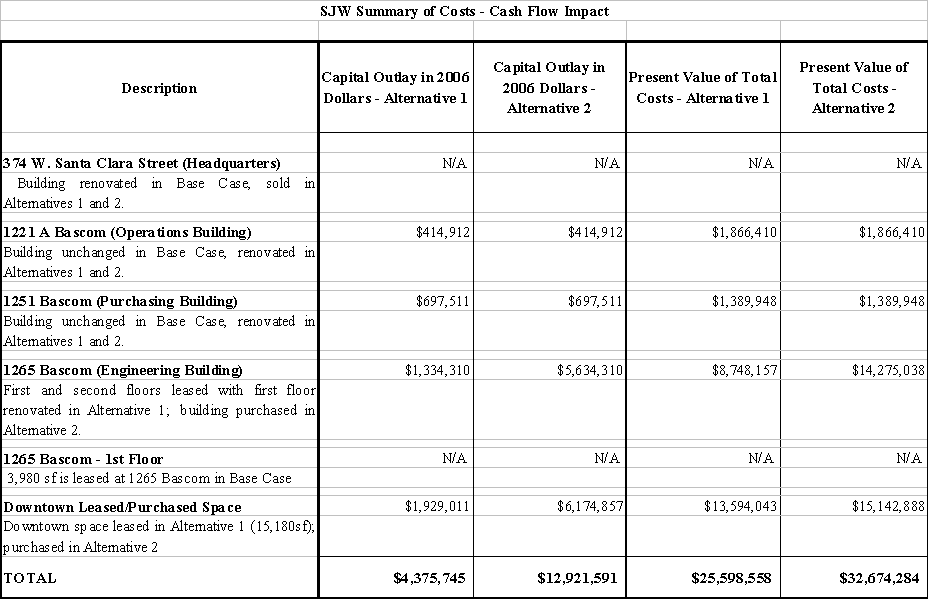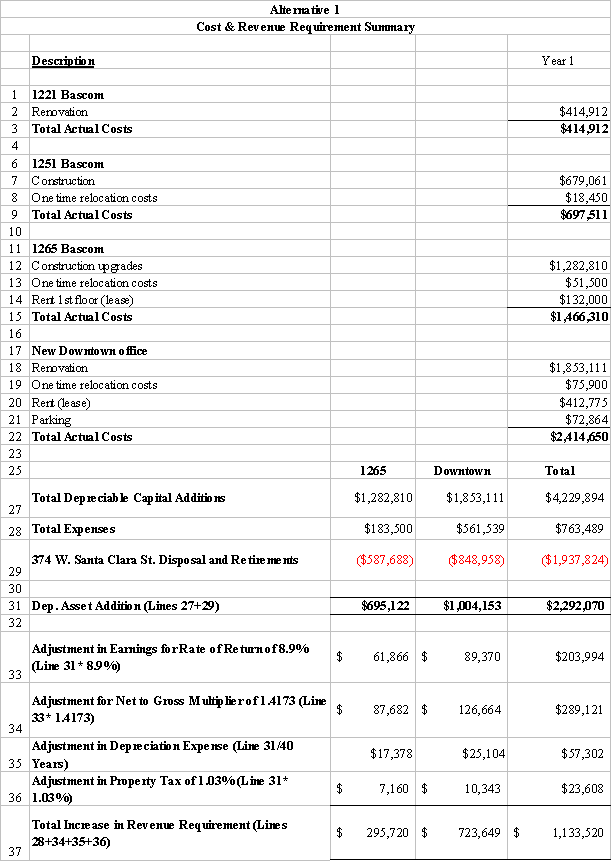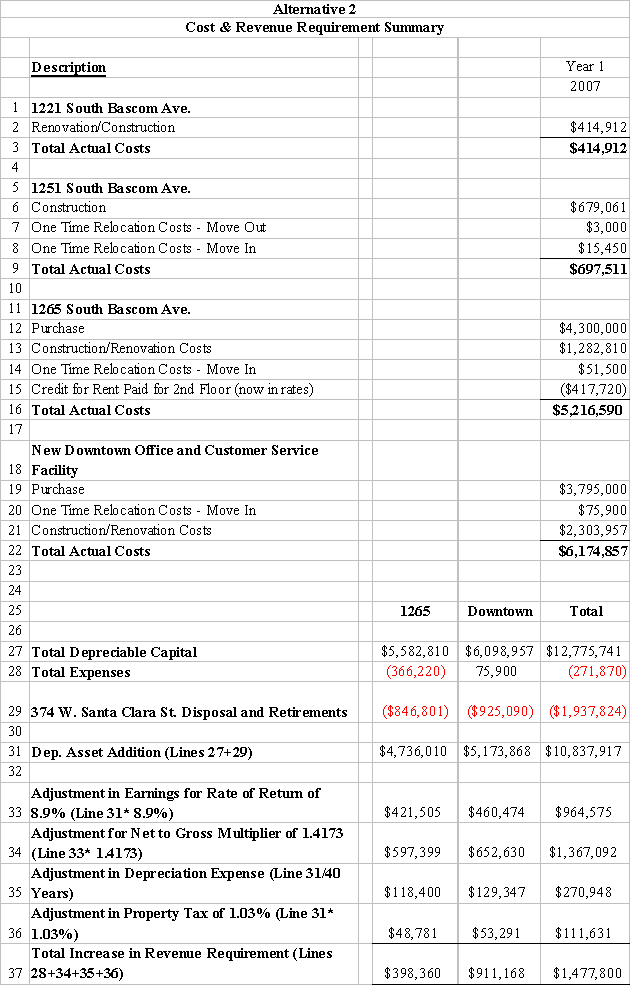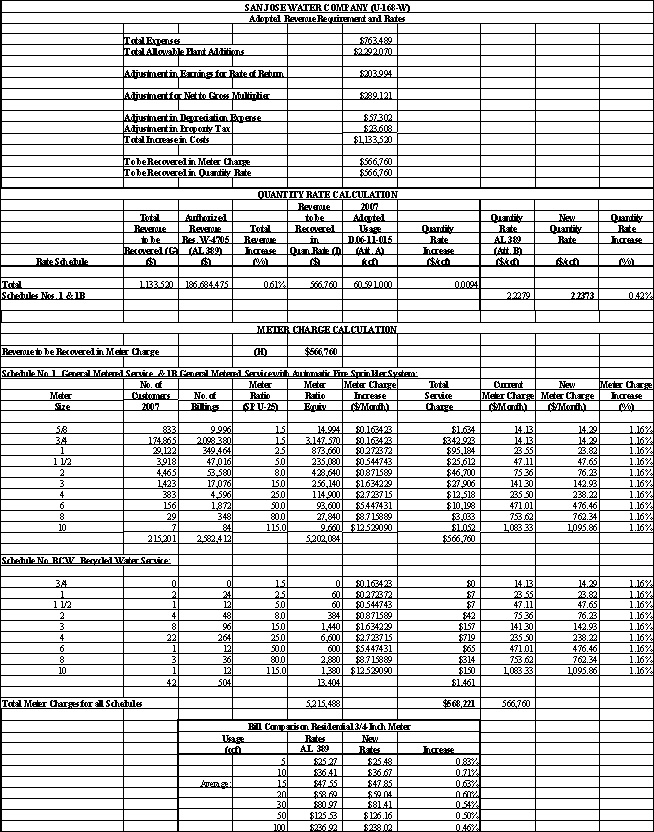13. Assignment of Proceeding
Dian M. Grueneich is the assigned Commissioner and Richard Smith is the assigned ALJ in this proceeding.
1. The 2004 and 2007 RCPs do not prohibit Class A water utilities from filing applications, rate base offsets or requests for other proceedings between scheduled GRCs.
2. The Main Office was designated a City Historical Landmark in 1991 and, due to its historic status, the City requires an historic preservation permit to perform any work or cause any work to be performed on it.
3. Factors such as building security, ability to upgrade the building's systems and infrastructure, level of workplace noise, and access to customer service facilities for the physically disabled are necessary attributes to ensuring adequate facilities.
4. The handrails, fixtures, door hardware and restrooms in the Main Office do not comply with ADA requirements; the existing interior ramps do not comply with the building code; it is not possible to install an elevator in the Main Office to provide access for physically disabled employees or customers; and the set back from Santa Clara Street does not allow for a ramp at the main entrance to the Main Office, requiring physically disabled customers and employees to use the rear entrance.
5. Adequate access for the physically disabled cannot be provided given limited modifications that can be made to the Main Office as a designated historic landmark. If SJWC is required to retain the Main Office, physically disabled customers will be permanently denied reasonable access to SJWC's customer service center.
6. Requiring physically disabled persons to use the rear entrance of the Main Office is disruptive to employees' normal work activities when they are required to serve as impromptu escorts and is not an efficient use of utility personnel.
7. The rear entrance of the Main Office should remain locked for security purposes, and requiring physically disabled persons to use the rear entrance undermines the security of the facility.
8. As an historic landmark, security improvements such as card reader access locks or separation between customer and employee areas cannot be made to the Main Office to ensure the safety of SJWC's employees and customers.
9. Providing access for the public at another existing SJWC facility will not enhance the security of employees who remain at the Main Office.
10. The work environment in the Main Office is adversely affected by aircraft and freeway noise, but the historical landmark status of the building makes it impossible to implement adequate sound reduction improvements.
11. The Main Office cannot be sufficiently renovated to support upgrades to the air conditioning, plumbing, heating, electrical and communications systems due to the building's design, the materials used to construct it, and limitations on improvements that can be made to the Main Office as an historic landmark.
12. Requiring SJWC to remodel the Main Office and to use space at 1251 South Bascom Avenue or 1265 South Bascom Avenue unreasonably constrains SJWC's ability to situate its staff for optimal operational efficiency because SJWC will have to locate staff from the same departments in separate locations.
13. The Main Office is not an adequate facility because it cannot be sufficiently remodeled to upgrade the building's systems and infrastructure, provide reasonable access for disabled persons, provide a secure and adequate work environment, or provide flexibility to collocate departmental staff.
14. Requiring SJWC to retain and remodel the Main Office will not provide adequate facilities.
15. The revenue effects on ratepayers should be included in the DCF analyses of Alternatives 1 and 2 to reflect the true costs to ratepayers so that the NPVs and revenue requirements for these alternatives may be compared on an "apples-to-apples" basis.
16. The DCF analyses should include return on investment costs paid to SJWC's shareholders by SJWC's ratepayers because excluding these costs related to the purchases of the Replacement Facility and 1265 South Bascom Avenue understates the actual costs of the different options.
17. Because the tax effect on debt is different from that for equity, 1.4173 should be used as the NTG multiplier when calculating the revenue requirement for this project.
18. The purchase of the Replacement Facility is not eligible for tax deferral as a Section 1031 property exchange.
19. The NPV of the Alternative 1 is $25,598,558.
20. The revenue requirement of Alternative 1 is $1,133,520.
21. Alternatives 1 and 2 both provide adequate facilities, but Alternative 1 results in a lower revenue requirement than Alternative 2.
22. SJWC's request to recover 50% of the revenue requirement through the service charge component and the remaining 50% through the quantity rate component of its tariffed rates is consistent with Commission policy.
23. The Main Office is currently in rate base and generating a revenue requirement, is currently occupied and used to provide utility service, and will continue to be necessary and useful for providing utility service at, and after, the time of sale.
24. The net proceeds from the sale of the Main Office are not eligible for reinvestment pursuant to § 790.
25. The net proceeds from the sale of the Main Office are $1,525,193.
26. The Percentage Allocation Rule provides that utility ratepayers receive 100% of the gains or losses on the sale of depreciable water utility assets, and ratepayers and shareholders split the gains or losses from non-depreciable property 67%-33%, respectively.
27. If the net proceeds from the sale of the Main Office are apportioned according to book values, the non-depreciable land accounts for 2.4% of the gain to be split "67/33" between ratepayers and shareholders, and depreciable structures and improvements account for 97.6% of the gain that should be allocated 100% to ratepayers.
28. The ratepayers' share of the gain on the sale of the Main Office is $1,513,209.
29. D.06-11-015 approved a settlement between SJWC and DRA on SJWC's most recent GRC, including approval of the lease payments to SJWLC for the 1265 South Bascom Avenue facility.
30. SJWC has not requested and does not require Commission authority to purchase 1265 South Bascom Avenue.
31. The Commission's affiliate transaction rules in SP U-21-W are applicable to water utilities when the utilities have a holding company and non-regulated affiliates. These rules provide that, unless in conflict with statute or other Commission orders, transfers of tangible or intangible assets from an affiliate or its holding company to a water utility shall be at fair market value.
32. SJWC did not make a false statement to the Commission or attempt to mislead the Commission about the purchase of 1265 South Bascom Avenue.
1. SJWC should be authorized to sell the Main Office because it is not an adequate facility.
2. The agreed upon selling price of $4,000,000 for the Main Office is reasonable.
3. The net proceeds from the sale of the Main Office should be allocated to ratepayers and shareholders pursuant to the Percentage Allocation Rule.
4. The ratepayers' share of the net proceeds from the sale of the Main Office should be distributed to customers through a monthly surcredit to customer bills for a period not to exceed one year.
5. The estimated proceeds from the future sale of the Replacement Facility and 1265 South Bascom Avenue should not be included in DCF analyses because the reasonableness of the sale prices or the eligibility of the sales proceeds for reinvestment in utility property are beyond the scope of this proceeding.
6. The DCF analysis of Alternative 2 should not include the full $6.7 million purchase price for the Replacement Facility because it is not requested in the Application, and it is beyond the scope of this proceeding to anticipate a future application that SJWC may file to seek recovery of the remainder of the purchase price, or to consider in this proceeding issues appropriate for that yet-to-be-filed application.
7. The DCF analyses should not include income derived from leasing excess space in the Replacement Facility because that excess space is not property necessary or useful in the performance of SJWC's duties to the public and will not be included in rate base.
8. The DCF analysis of Alternative 1 should be revised to escalate estimated parking fees at 3% per year for all years analyzed, and should be revised to exclude O&M costs.
9. The DCF analyses should use 1.4173 as the NTG multiplier to reflect the weighted cost of debt and equity.
10. Depreciation expense should be based on gross plant.
11. The DCF analyses should not include the deferral of taxes allowed under the Internal Revenue Code.
12. An alternative that may cost less but which results in inadequate facilities is not in the best interests of ratepayers.
13. The increase of $1,133,520 in the revenue requirement for 2008 is reasonable and should be approved.
14. The determination of whether SJWC should be authorized to include in rate base some or all of the costs for the purchase of 110 West Taylor Street or the purchase of 1265 South Bascom Avenue should be deferred to SJWC's next GRC.
15. SJWC should be authorized to establish a memorandum account to track costs associated with the purchase of 110 West Taylor Street or the purchase of 1265 South Bascom Avenue, including interim depreciation and other expenses, such as taxes, for retroactive recovery.
16. Commission approval to sell necessary or useful utility property does not render property unnecessary or no longer useful.
17. SJWC's request for authorization to reinvest the net proceeds from the sale of its Main Office in infrastructure pursuant to § 790 should be denied.
18. SJWC's lease payments to SJWLC for the 1265 South Bascom Avenue facility are not relevant to this proceeding because those payments were approved by D.06-11-015, and modification of D.06-11-015 is beyond the scope of this proceeding.
19. Issues concerning whether SJWC should have filed other applications pursuant to § 851 to sell one or more of the five properties which DRA contends were improperly transferred to SJWLC are beyond the scope of this proceeding.
20. Whether and how the proceeds from the sale to third parties of the transferred properties affects SJWC's overall revenue requirement are beyond the scope of this proceeding.
21. SJWC was under no obligation to affirmatively alert the Commission that it purchased 1265 South Bascom Avenue.
22. SJWC did not violate Rule 1.1.
23. Today's order should be made effective immediately.
IT IS ORDERED that:
1. San Jose Water Company's (SJWC's) application for Commission authority pursuant to Pub. Util. Code § 851 to sell its Main Office located at 374 West Santa Clara Street, San Jose, is granted.
2. An increase of $1,133,520 in SJWC's revenue requirement for 2008 is approved.
3. As shown in Appendix D to this decision, 50% of the additional revenue requirement shall be recovered through the service charge component of SJWC's tariffed rates and the remainder shall be recovered through the quantity rate component of SJWC's tariffed rates.
4. The determination of whether SJWC should be authorized to include in rate base some or all of the costs for the purchase of 110 West Taylor Street or the purchase of 1265 South Bascom Avenue shall be deferred to SJWC's next general rate case.
5. SJWC is authorized to establish a memorandum account to track costs associated with the purchase of 110 West Taylor Street or the purchase of 1265 South Bascom Avenue, including interim depreciation and other expenses, such as taxes, for retroactive recovery.
6. SJWC's request for a Commission determination that its Main Office is no longer necessary or useful is denied.
7. SJWC's request for authorization to reinvest the net proceeds from the sale in infrastructure pursuant to Pub. Util. Code § 790 is denied.
8. The net proceeds of $1,525,193 from the sale of the Main Office shall be apportioned to SJWC's shareholders and customers in accordance with the Percentage Allocation Rule.
9. The SJWC's customers' share from the gain on the sale of the Main Office in the amount of $1,513,209 shall be distributed to SJWC's customers through a monthly surcredit to customer bills for a period not to exceed one year.
10. Application 07-01-035 is closed.
11. This order is effective today.
Dated October 2, 2008, at San Francisco, California.
MICHAEL R. PEEVEY
President
DIAN M. GRUENEICH
JOHN A. BOHN
RACHELLE B. CHONG
TIMOTHY ALAN SIMON
Commissioners
I will file a concurrence.
/s/ JOHN BOHN
Commissioner
I reserve the right to file a concurrence.
/s/ DIAN GRUENEICH
Commissioner




Concurrence of Commissioner John Bohn
Today's decision correctly resolves the ratemaking treatment for the main office for San Jose Water Company (SJWC). However, the facts of this case highlight a need to provide additional clarity on how to achieve compliance with Section 790 when large assets are no longer used and useful. Because this is the first water case to arise since the adoption of the Commission's Gain on Sale decision (D.06-05-041), it highlights the interconnectedness of the Gain on Sale provisions under Section 851 and the Section 790 reinvestment provisions. But this decision does not go far enough. Our administrative law judges and the utilities subject to our jurisdiction need a roadmap that addresses the dilemma water utilities face in replacing inadequate facilities in a manner in which they may take advantage of the reinvestment opportunities pursuant to Section 790.
I would like to explore ways in which this dilemma could be resolved. It is not our intention to disadvantage either the customers or the shareholders of any utility under our jurisdiction through the application of our regulations. This decision has brought forward a conflict that could result in the loss of benefit for the utility's shareholders and the loss of reinvestment opportunities that would be of benefit to the utility and its customers. Today's Decision is the first time since the Gain on Sale Decision that the Commission has considered a water utility's request to dispose of real property and to reinvest the proceeds from the sale pursuant to Section 790. SJWC's application highlights the difficulties water utilities face in taking advantage of reinvestment opportunities pursuant to Section 790.
Under current regulation, water utilities face a dilemma. They may either (1) Seek Commission approval prior to removing property from rate base to avoid violating Section 851 (as SJWC did in this case), and in so doing ensure that proceeds from the sale are not eligible for reinvestment pursuant to Section 790; or (2) Remove the property from rate base and dispose of it, and risk violating Section 851 if the Commission later determines the property was necessary or useful. I would like to ensure that in the future, water utilities have every opportunity and incentive to reinvest proceeds from the sale of assets pursuant to Section 790 in appropriate ways in cases like this one.
There are two possible ways the Commission could approach this dilemma. Let us not seek legislative changes to Section 790, a daunting task. We should instead revisit the requirements established in the Gain on Sale Decision. The Commission should establish a provision that, pursuant to a Section 851 application, a Commission finding that a real property asset is inadequate for utility service is sufficient to authorize a water utility to remove the asset from service and rate base (i.e., to classify the asset as no longer necessary or useful). This would allow the utility to sell the asset and to reinvest the proceeds from the sale pursuant to Section 790.
This is an opportunity to further refine our goal of encouraging proper reinvestment in water infrastructure. I will seek support from my fellow Commissioners to advance this improvement in the Gain on Sale decision.
/s/ JOHN A. BOHN
John A. Bohn
Commissioner
San Francisco, CA
October 2, 2008


